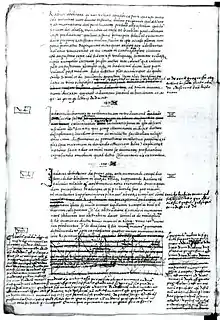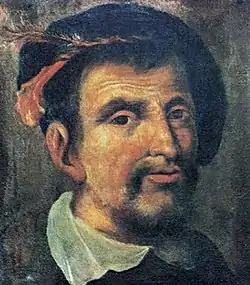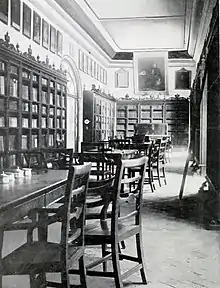Libro de los Epítomes
The Libro de los Epítomes (The Book of Epitomes) is a catalogue summarising part of the library of around 15-20,000 books which Ferdinand Columbus (Spanish: Fernando Colón) assembled in the early sixteenth-century in an effort to create a library of every book in the world. The manuscript is currently part of the Arnamagnæan Manuscript Collection.

Background and library

Ferdinand Columbus (1488–1539) was a Spanish bibliographer and cosmographer, and the son of the explorer Christopher Columbus.[1] In the early sixteenth century he embarked on a project to create a library of every book in the world, assembling around 15–20,000 books during his lifetime and creating the largest library of his day. Unlike other collectors who sought Greek and Latin manuscripts, Columbus recognised the significance of print and prioritised printed books and ephemeral and popular printed material such as ballads and newspapers.[2]
The collection has been housed at Seville Cathedral since 1552, but only about a quarter of the books have survived; these form the Biblioteca Colombina of the Institución Colombina.[3]
The Book of Epitomes
To create the Libro de los Epítomes, Columbus used a team of readers and writers to prepare a summary of each book in his library. The entries vary from just a few lines for the smaller works to around 30 pages for major works such as the writings of Plato.[3] There are close to 2,000 summaries in the book,[4][5] which consists of 982 leaves (1,964 pages) and is 14 centimetres (5.5 in) thick.[4][5]
Rediscovery


The catalogue was positively identified in 2019, after Guy Lazure of the University of Windsor in Canada suggested it could be a "bibliographical tool" from Ferdinand Columbus's library.[4] It had been thought lost since its existence was last recorded in Spain at the time of Columbus's death.[2][3][6] It was found as part of the Arnamagnæan Manuscript Collection in Copenhagen, a collection established by Árni Magnússon (1663–1730), an Icelandic scholar who donated his collection to the University of Copenhagen at his death in 1730.[4] The manuscript is currently part of the Arnamagnæan Manuscript Collection with the shelfmark AM 377 fol.[4][5]
N. Kıvılcım Yavuz suggests that the volume might have arrived in Denmark together with a collection of manuscripts brought by Cornelius Lerche, an envoy to the Spanish court.[4]
A similar catalogue of Columbus's collection of some 3,200 prints was already known, and was published in 2004.[7]
Significance and future work
According to University of Cambridge academic Edward Wilson-Lee, author of a recent biography of Columbus and account of his library, The Catalogue of Shipwrecked Books, "It's a discovery of immense importance, not only because it contains so much information about how people read 500 years ago, but also, because it contains summaries of books that no longer exist, lost in every other form than these summaries".[3]
Plans for the manuscript to be digitised and transcribed were already hinted at in April 2019.[4] In December 2019, Matthew James Driscoll from the Arnamagnæan Institute at the University of Copenhagen was awarded a three-year research grant by the Carlsberg Foundation to conduct further studies on the manuscript.[8][9] The project is titled "The Book of Books: Hernando Colón's Libro de los Epítomes" and is set to begin in April 2020.[9]
References
- Book of Lost Books Discovered in Danish Archive Jason Daley, Smithsonian.com, 11 April 2019. Retrieved 12 April 2019.
- Manuscript reveals lost books of Christopher Columbus' son's library. Interview with Edward Wilson-Lee, Newshour, BBC World Service, 10 April 2019. Retrieved 12 April 2019.
- Flood, Alison (10 April 2019). "'Extraordinary' 500-year-old library catalogue reveals books lost to time". The Guardian. Retrieved 10 April 2019.
- Yavuz, N. Kıvılcım (15 April 2019). "Hernando Colón's Book of Books: AM 377 fol". manuscript.ku.dk. Retrieved 20 May 2019.
- "El Libro de los Epítomes that belonged to Herna... | Manuscript | Handrit.is". handrit.is. Retrieved 20 May 2019.
- Joseph Brean (12 April 2019). "Professor discovers centuries-old attempt by Christopher Columbus's son to summarize every book in existence". National Post.
- McDonald, Mark. (2005) Ferdinand Columbus: Renaissance Collector (1488-1539). London: British Museum Press. ISBN 978-0-7141-2644-9 (he also edited the 2 volume catalogue, published in 2004.)
- Carlsberg Foundation. "The Book of Books: Hernando Colón's Libro de los Epítomes". www.carlsbergfondet.dk. Retrieved 2020-02-09.
- Arnamagnæan Institute (2019-12-05). "The Book of Books: Hernando Colón's Libro de los Epítomes". nors.ku.dk. Retrieved 2020-02-09.